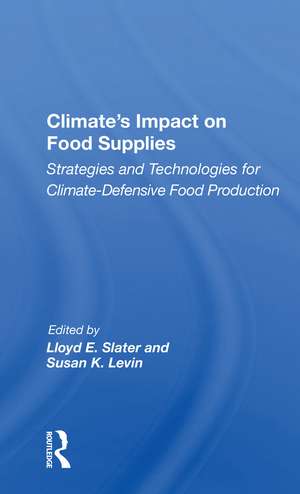Climate's Impact On Food Supplies: Strategies And Technologies For Climate- Defensive Food Production
Autor Lloyd E. Slateren Limba Engleză Paperback – 19 oct 2020
| Toate formatele și edițiile | Preț | Express |
|---|---|---|
| Paperback (1) | 258.63 lei 6-8 săpt. | |
| Taylor & Francis – 19 oct 2020 | 258.63 lei 6-8 săpt. | |
| Hardback (1) | 767.64 lei 6-8 săpt. | |
| Taylor & Francis – 18 apr 2019 | 767.64 lei 6-8 săpt. |
Preț: 258.63 lei
Preț vechi: 318.24 lei
-19% Nou
Puncte Express: 388
Preț estimativ în valută:
49.50€ • 53.79$ • 41.61£
49.50€ • 53.79$ • 41.61£
Carte tipărită la comandă
Livrare economică 21 aprilie-05 mai
Preluare comenzi: 021 569.72.76
Specificații
ISBN-13: 9780367168643
ISBN-10: 0367168642
Pagini: 264
Dimensiuni: 146 x 229 mm
Greutate: 0.39 kg
Ediția:1
Editura: Taylor & Francis
Colecția Routledge
Locul publicării:Oxford, United Kingdom
ISBN-10: 0367168642
Pagini: 264
Dimensiuni: 146 x 229 mm
Greutate: 0.39 kg
Ediția:1
Editura: Taylor & Francis
Colecția Routledge
Locul publicării:Oxford, United Kingdom
Cuprins
Introduction Part 1: Viewing the Climate/Food Interaction 1. Climate's Impact on Food Supplies: Can It Be Identified? 2. Climate, Food and Society 3. Uses of Climatic Knowledge in the Food Systems of Developing Countries 4. Climate-Defensive Policies to Assure Food Supplies 5. Botswana's Food: A Case of Livestock versus Climate 6. Case Studies of the Multinational Corporation as a Food/Climate Buffer Part 2: Reducing Climate's Impact 7. Three Approaches to Reducing Climate's Impact on Food Supplies 8. The Promise of Food and Climate Information Systems 9. A Microecological View of Arid Land Agriculture 10. Technologies and Strategies in Weatherproofing Crop Production 11. New Options for Climate-Defensive Food Production 12. Synthetic Foods: Eliminating the Climate Factor
Descriere
This book assesses theories of how climate influences food production and distribution, discusses how societies can contend with climate-induced food shortfalls, and explores policies and technologies that promise to reduce climate's impact on agriculture and to increase food production.
